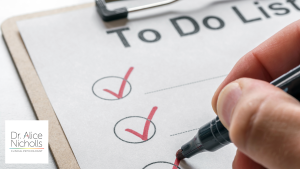If you have school aged children and you are in Autistic Burnout just the idea of the school holidays may be sparking all kinds of thoughts and feelings.
You might be eagerly anticipating losing the demands of the school run and having the opportunity to slow down the pace of life. You might be looking forward to connecting with your children and enjoying some shared activities with them.
You might also be feeling anxious and even dreading the school break, worrying about how you are going to cope with the change in routine and increased demands for child care, management and entertainment.
You might be feeling pressurised to make the holidays fun and to enjoy this time with your children, when frankly it feels like the last thing you need.
And of course you might feel ashamed for feeling anything less than positive about the school holidays.
If you are feeling any or all of the above then this article is for you.
I am going to discuss each of these challenges in turn with some ideas for how you might manage them:
- Loss of usual childcare
- Loss of usual routines
- Loss of usual regulating and restful activities
- Increased need to entertain children
- Pressure to provide an enjoyable experience
Loss of usual childcare
School may be your only or most significant source of childcare. Without it you might have less time and energy for your usual activities, whether these include work, housework, focusing on recovering from Autistic Burnout, managing a health condition, engaging in your hobbies, or resting.
If you have access to holiday clubs, paid childcare or that provided by family member please consider using it.
So often people in Autistic burnout think that because they are off work they don’t need or shouldn’t use childcare that might be available to them. You might feel guilty for not wanting to spend the whole of the holidays with your children.
If you are already worrying about how you will cope and this is an option, you may be able to increase the quality of your time with your children by pacing yourself and having some support with childcare.
It is also very normal for children to attend childcare during the school holidays for many families who are unable to take time off work or are unwell, or who just want a break.
If childcare is not available to you, or not enough, or it is not appropriate for your child then please keep reading.
Loss of routines
The school day provides many routines for us, from getting everyone up, ready, and out of the house in the mornings to structuring when we do our personal care, hobbies, housework and work.
These routines provide us with stability and predictability and you may find the loss of them means you have to draw more heavily on your executive functioning skills which are likely not functioning at their best.
You may also find that your children find the lack of predictability overwhelming and anxiety provoking
Having to work out on a daily basis when and how to go about getting every one dressed and ready for the day or when to do the food shop and when to wash your hair etc. can add significantly to your mental load and stress levels.
It may also cause dysregulation in your children, particularly if they are also neurodivergent.
Here are some things that might help:
- Consider what you can drop/reduce/postpone from your usual demands. For example:
- Reducing working hours
- Using pre-prepared foods/ ready meals/takeaways
- Cleaning less, hiring a cleaner, or getting children involved in small cleaning jobs.
- Creating new ‘holiday routines’ for daily tasks. For example:
- Getting everyone up at a set time each day
- Having meals at the same time each day
- Maintaining term time bedtime routines
- Creating a structure to your weeks. This could be a loose structure or guide to your planning, or it could be a baseline routine depending on what works for you for example:
- 1 big outing a week, 1 day of doing things at home, 1 day at holiday club, 1 day with friends/family/playdate
- Monday: day trip, Tuesday: craft at home, Wednesday: swim, Thursday: park, Friday: playdate.
- Plan out when you will do tasks that you are not able to avoid or postpone. putting them into a weekly routine for the holidays.
- It might help you and/or your children to write out planned activities on a sheet of paper so you can visualise what you are going to do and when. This creates predictability and helps you to keep track of what you have booked. It may also prevent some repetitive questions about what you are doing today, tomorrow, this week etc (note, my personal experience is that this really helped my autistic child to be less anxious about the holidays, but it can be too much information for some children and lead to an increase in anxiety so please assess based on what you already know about your child)
Loss of usual regulating and restful activities
You may have been using the school day to engage in your hobbies, regulating activities or just to have some time to rest.
If you are still able to do some of these activities around your children and any childcare you have access to then please prioritise this.
If these activities are just not possible around your children then here are some ideas for things to try:
- Building ‘downtime’ into your daily holiday routines. You might notice a time of day, perhaps after lunch or after returning home from a trip out where your children need less input from you. Or maybe there is an activity they can do at home where they need less input from you, for example: watching TV, playing video games, reading, playing in the garden.
- Create a list (either in your head or on paper) of small easy soothing activities you can do while you are looking after the children for example:
- Putting on handcream
- Taking a few soothing breaths
- Drinking a favourite drink or having a favourite snack
- Looking outside, making an effort to look side to side and noticing what you can see (not just looking straight ahead.
- Having a favourite fidget toy in your pocket.
- Think about sensory regulating activities that you can incorporate in your day and do with the children, for example:
- Walking
- Yoga (try cosmic kids yoga on you tube)
- Having a dance party with the kids for a few minutes
- Crunchy/chewy foods
- Swinging in the park or in a hammock
- Consider activities your children find calming that you might do together or at the same time. Older children might be able to write a list with you and you can go through it together thinking about which activities you both find calming and/or regulating and find things that you all find helpful, for example:
- Play dough/clay
- Colouring/ painting
- Water/ sensory play
- Watching films/ TV shows you all like (Bluey is the only show my whole family can access/ enjoy)
Increased need to entertain children & pressure to provide an enjoyable experience
There is a lot of pressure on parents to provide constant entertainment. Whereas in years gone by children would have played outside with their friends for hours and hours with relatively little supervision, this is no longer safe or acceptable for many of us.
However, it is not realistic to think that you will be able to entertain your children every moment of the day either.
Consider also that children need a break from the demands of school and will have their own ideas about what they want to do.
If your child is happy playing video games or engaging in their own hobbies then making time for this can take the pressure off all of you.
It is worth discussing what the children want to do over the holidays with them and being curious about what they would really like to do and setting realistic expectations.
You might phrase it like this:
- I’m just thinking of things we could do this holiday, do you have an ideas?
- What do you love doing in the holidays?
- What’s your favourite place to go for a day trip?
- What’s your favourite thing to do at home?
- Can you write me a list of things you would like to do this summer? I can’t promise we will do them all but I’d like some ideas.
If your child is not able to tell you what they want to do then you may have to rely on your previous experience of what they have enjoyed doing in the past.
Consider your capacity before agreeing to anything. If your child suggests something that you know is going to be too stressful for you to do, be honest and consider suggesting something similar that feels more manageable, for example:
- I don’t think I can manage having people come round to the house for a playdate but how about we ask if they would like to meet us in the park?
- That swimming pool gets really noisy and gives me a headache but having a splash about is a great idea, how about we go to the beach/ park with a paddling pool?
Making it clear that you want to help them enjoy their holiday and that you are taking their needs and wants into account, even if you can’t fulfil all of them will help your child to feel acknowledged and appreciated and will also show them how to look after themselves and negotiate with other people about their needs.
Summary
The school holidays can present some pretty massive challenges when you are a parent without adequate support, even more so in Autistic Burnout.
There is also a real opportunity to find new ways of resting and regulating while connecting with your child.
It can help to create some new ‘holiday specific’ routines and engage in activities that you find regulating or restful that you can do with or around your children.
Please get support wherever you can and look after yourself the best you can given the resources available to you.
I am an Autistic Clinical Psychologist specialising in Autistic Burnout if you would like to know more about my work please check out my:
- Mailing list community for people who want to receive helpful information and resources about Autistic Burnout.
- Free short course on How to Break the Cycle of Autistic Burnout (link goes straight to registration page)
- Authenticity Basecamp: A 90 day support programme for people in the early stages of recovering from Autistic Burnout who want to get calmer, clearer and more supported.
- Authenticity: The Course and Community: For late-realised, high-masking Autistic adults who want to build more sustainable, authentic lives and break free of the cycle of Autistic Burnout for good.









